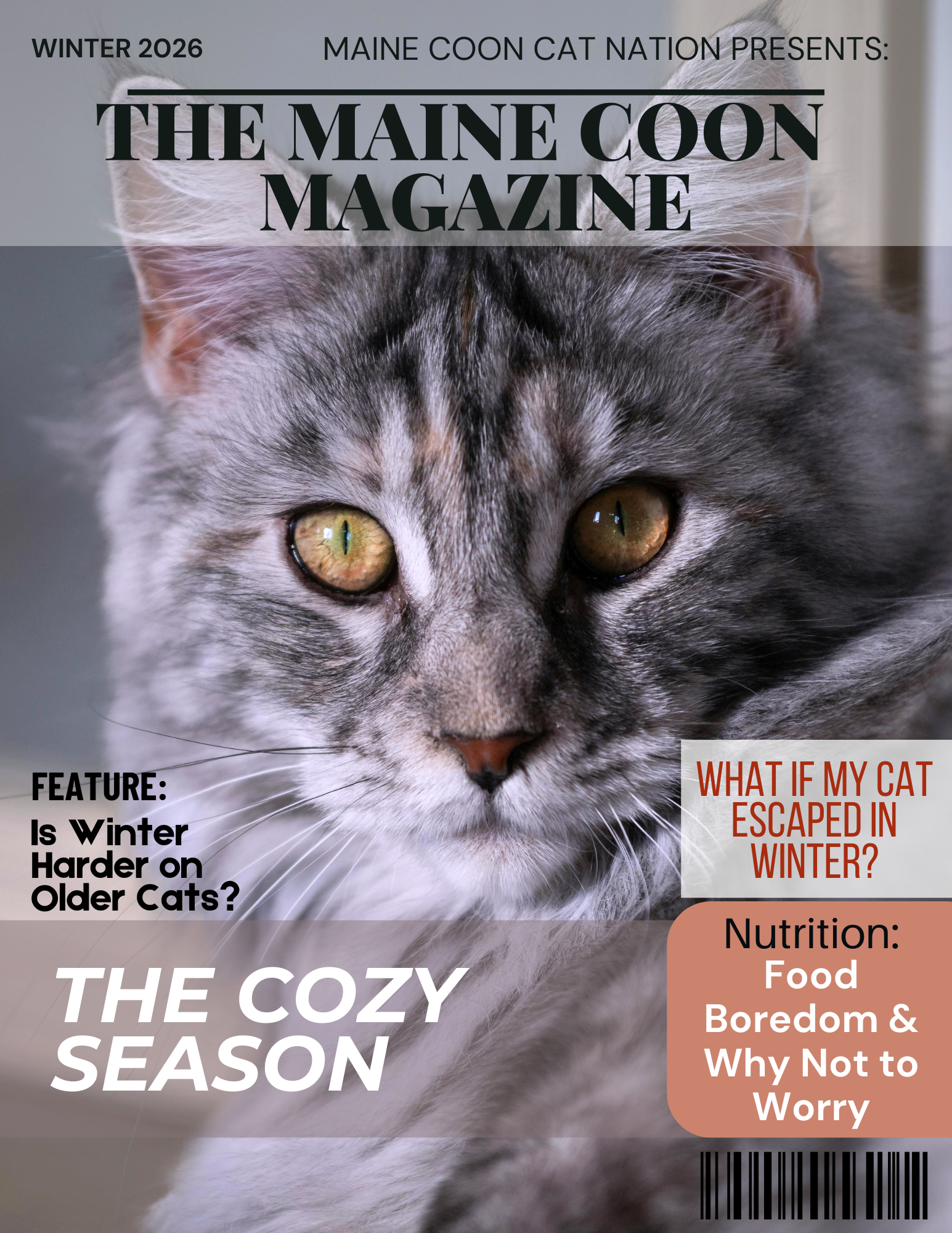- Home
- Maine Coon Cat Health
- Home Remedies For Hairballs
Disclosure: this site is reader-supported. When you buy through links on our site, we may earn a small commission, at no extra cost to you.
Home Remedies For Hairballs
Frequent hairballs are a huge nuisance, and they have got to go! These home remedies for hairballs are sure to help!
More and more cat parents are opting for a natural approach to taking care of their pets in every aspect.
From diet to flea control to furballs - basically, everything we put in or on our fur-babies!
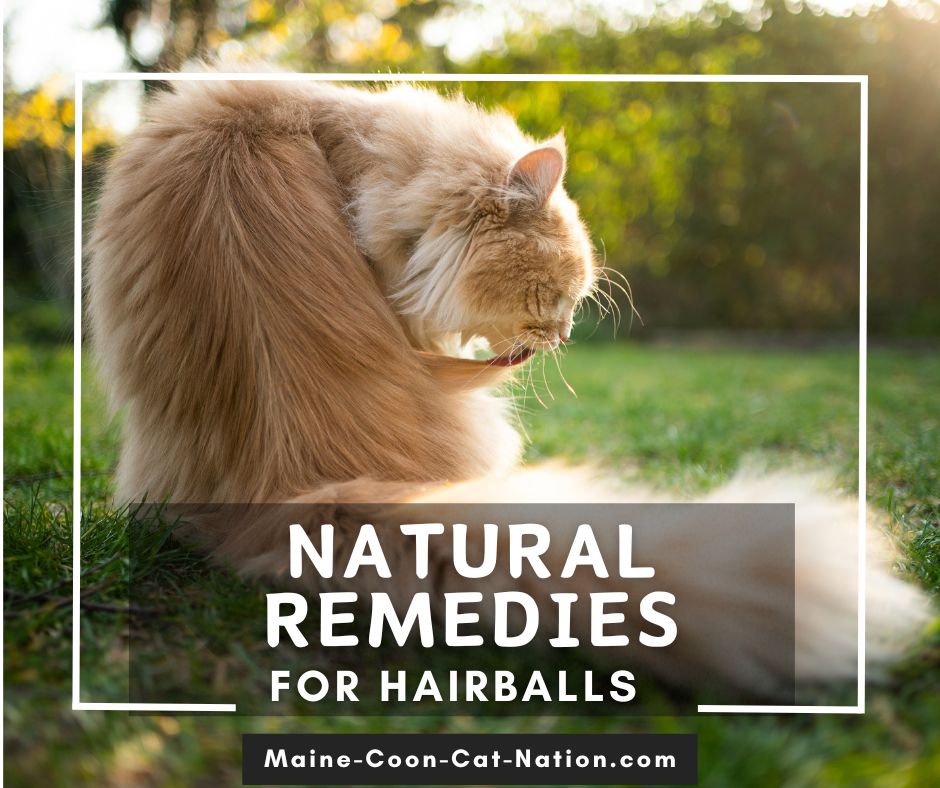
Let's talk about the benefits of brushing, and reveal an arsenal of natural hairball remedies commonly used.
If you like this, you'll love our fun, free Daily Digest!

The first, and perhaps most effective home hairball remedy is the simplest. Brushing a cat regularly will greatly reduce the excess hair on him.
Why? Every bit of hair you can brush off will be that much less fur for him to swallow at grooming time.
Brushing:
If you have ever felt or looked closely at a cat's tongue, you know about those little barbs. It's like a mini-brush!
These rough tongues are great for grooming, but cats don't actually have the physical ability to spit anything out.
Once the fur, or hair, is in their mouth, it can only go in one direction - and become a hairball.
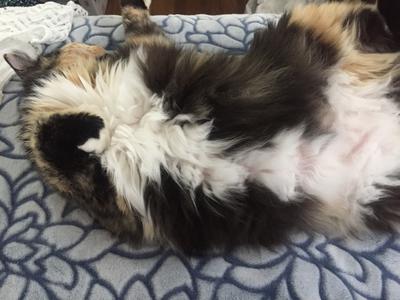
Many kitties love to be brushed, and if your cat is one of them, you are all set!
This might be the only natural hairball remedy you'll need.
Other cats tolerate it, and some simply despise it.
If your feline friend falls in the latter category, you have some work on your hands.
It is really important to try to get your longhaired cat in a brushing routine - especially if he or she indulges in excessive grooming. Here are a few tips for a stubborn cat:
- Try brushing just a little at a time at first, even if it's just a stroke or two
- Brush your cat when he's sleepy, happy, and content
- Consider brushing in a small, enclosed room so he doesn't try to flee
- Have a brush handy near your favorite "snuggling spot" or chair. When he comes to your lap, give him a stroke or two with the brush and put it aside until another time
- Give your cat a treat after he's exposed to a bit of brushing time. He'll associate the brush with good things and be more accommodating next time (hopefully!)
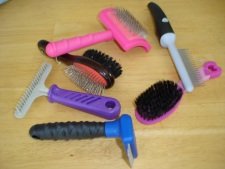
Do you have a drawer full of brushes? Admittedly, it's not easy to work it in to the schedule.
Especially when you are confronted with a brush you know doesn't work great.
I used to dread pinning a cat down to use an ineffective tool on him or her. The bristles on some just didn't work, and on others they caused discomfort, pulling on the skin.
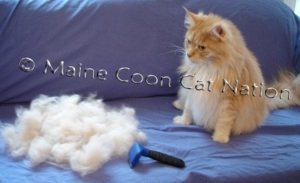
Each year, pet grooming tools continue to improve, making it easier for us to care for our furry friends.
As technology and design evolve, brushes are becoming more efficient at tackling mats, tangles, and shedding, while also being gentler on your pet's skin.
One of the latest innovations is this dual-sided grooming brush, specifically designed for long-haired breeds like Maine Coons.
It has one side for stubborn mats and tangles, and another for deshedding and thinning out your cat's coat.
Lightweight and easy to use, this brush has over 71k reviews and counting! You can check it out here to make grooming a breeze!
Oral Hairball Remedy Options: What You Need To Know
Sometimes a combination of home remedies for hairballs works best.
There are two main types of oral hairball treatments: fiber supplements and lubricants. Both can help move hairballs through the digestive system, but they work in different ways.
Fiber-Based Hairball Treatments
Fiber hairball treatment helps to push the hairball through your cat's digestive tract, acting as a natural laxative. These remedies should be used until the hairball passes, and then only occasionally afterward to prevent recurrence.
However, too much fiber can cause other problems, so it's important to find a balance.
Hairball Control Foods and Treats
Hairball control cat food is a common option. These hairball diets typically contain two to ten times the usual amount of fiber, so transitioning to them gradually is essential.
If introduced too quickly, your cat may experience bloating, gas, or digestive discomfort.
Keep in mind that a high-fiber diet can have nutritional drawbacks. When there's more fiber in the food, there’s less room for other essential nutrients.
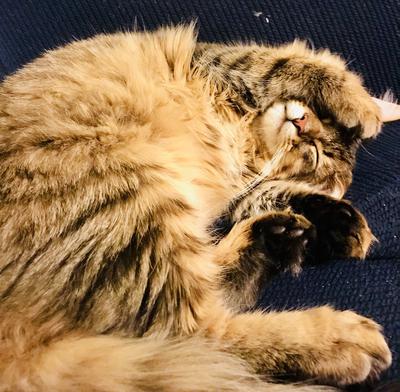
Also, cats on these diets need to drink more water to prevent urinary issues.
If you're looking for an easier approach, hairball control treats are a great option. They contain extra fiber, and most cats love them.
These treats allow you to add fiber into your cat’s diet without making major changes to their meals.
Supplementing Your Cats Diet with Fiber
Some natural supplements can also help with the occasional hairball. For instance, adding about a teaspoon of flaxseed, fish oil, or olive oil to your cat's food can help move things along.
One of the most tried-and-true home remedies is canned or fresh pureed pumpkin. Cats usually love pumpkin mixed with their wet food or as a separate treat.
Again, about a teaspoon per day is enough until the hairball passes. After that, it's best to limit these supplements to once or twice a week to avoid disrupting your cat’s vitamin absorption.
* If using canned, make sure the only ingredient is pumpkin. Some cans of pumpkin are already spiced for pie filling.
If you're unsure about measuring and administering fiber at home, don’t worry.
There are many natural hairball remedies available on the market with clear dosage instructions, so you can be confident you're giving your cat the right amount.
Lubricant-Based Hairball Treatments
Fiber helps the intestines work harder to move hair through, but it doesn't do much for hair that's stuck in the stomach.
That's where lubricants come in. These products help hairballs slide through your cat’s digestive system more easily.
Vaseline and Petroleum-Based Lubricants
Vaseline has long been a go-to natural remedy for helping hairballs pass. It doesn't break down or digest, so it sticks to the hairball and helps it move through the entire digestive tract.
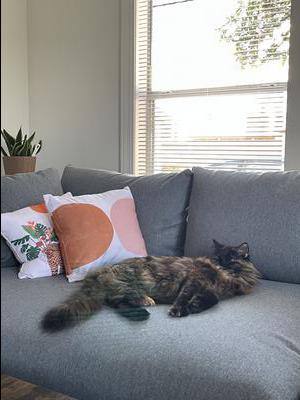
However, you should only give your cat a small amount of Vaseline - no more than once or twice a week.
Too much can prevent your cat from absorbing essential fat-soluble vitamins like A, D, and E.
Interestingly, some cats love Vaseline and might even beg for it! While it's safe in small amounts, some people prefer not to give their cats petroleum-based products.
For those who are uncomfortable with Vaseline, there are non-petroleum alternatives that work just as well.
Non-Petroleum Lubricants
Today, many natural hairball remedies are available without petroleum. These products are just as effective at preventing an intestinal blockage and often contain ingredients like plant oils or other natural lubricants.
They work in much the same way as Vaseline by helping the hairball move through your cat's system.
For pet owners who prefer a natural approach, these are a great option to consider.
Preventing Hairballs: Hydration
In addition to using fiber or lubricants, regular grooming and ensuring your cat stays hydrated are key to preventing hairballs in the first place.
 Queso
QuesoCats often don’t drink as much water as they should, which can slow down their digestion and make it harder for hair to pass through.
Encouraging your cat to drink more clean water can help reduce hairball formation.
Consider adding more water bowls around the house or using a cat water fountain, as some cats prefer running water.
Wet food can also help increase your cat’s fluid intake, which will help with digestion.
Natural Remedies to Support Digestive Health
Natural remedies can complement fiber and lubricant treatments, helping to keep your cat’s digestive system running smoothly.
Herbal and Digestive Support Supplements
Some cat owners turn to herbal supplements to support their cat’s digestion and prevent hairballs.
Digestive enzymes or probiotics can help maintain healthy gut flora, making it easier for your cat to pass hair.
These supplements are available in powder or capsule form and can be added to your cat’s food.
As always, it's a good idea to consult your vet before starting any new supplement, especially if your cat has a pre-existing condition.
Homeopathic Remedies
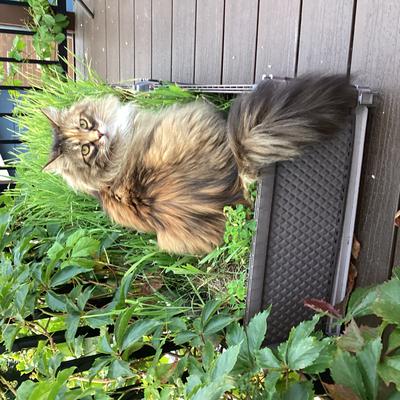
Some homeopathic remedies, such as those containing plant extracts like slippery elm or marshmallow root, may soothe the digestive tract and aid in hairball passage.
While these home remedies for hairballs aren't scientifically proven, some pet parents find them helpful. Again, it's wise to check with your vet before using these treatments.
Home Remedies For Hairballs FAQ's
How often should I give my cat fiber supplements for hairballs?
How often should I give my cat fiber supplements for hairballs?
Fiber supplements like canned pumpkin or flaxseed should be given daily until the hairball passes.
After that, you can reduce it to once or twice a week to prevent future hairballs.
However, too much fiber can interfere with nutrient absorption, so always consult your vet if you're unsure.
Is it safe to give my cat Vaseline for hairballs?
Is it safe to give my cat Vaseline for hairballs?
Yes, Vaseline can be a safe hairball remedy when used in moderation.
Petroleum jelly helps lubricate the digestive tract, allowing the hairball to pass. However, limit it to once or twice a week, as too much can prevent your cat from absorbing essential vitamins like A, D, and E.
Can I switch my cat to a high-fiber diet to prevent hairballs?
Can I switch my cat to a high-fiber diet to prevent hairballs?
Hairball treats and food can be an effective solution for cats prone to hairballs, as it contains extra fiber.
However, you should transition to the new food gradually to avoid digestive issues.
Keep in mind that a high-fiber diet should be balanced with plenty of water to avoid urinary issues.
How often should I brush my cat to reduce hairballs?
How often should I brush my cat to reduce hairballs?
For long-haired cats, like Maine Coons, daily brushing is ideal, especially during shedding seasons.
Regular brushing removes loose fur before your cat can ingest it, which helps reduce hairballs significantly.
Are there natural alternatives to petroleum-based hairball remedies?
Are there natural alternatives to petroleum-based hairball remedies?
Yes, there are many natural hairball remedies available, including plant-based oils and non-petroleum lubricants.
These options are just as effective at helping hairballs pass and are a good choice if you prefer a more natural approach to your cat's care.
So, between grooming, fiber and lubricants, cat hairballs can become a thing of the past! Home remedies for hairballs can be the ticket to a comfortable, happy and healthy cat.
Top of Home Remedies for Hairballs
« Back to Maine Coon Health
